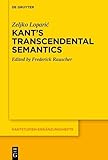Kant’s Transcendental Semantics / Zeljko Loparic; ed. by Frederick Rauscher.
Material type: TextSeries: Kantstudien-Ergänzungshefte ; 227Publisher: Berlin ; Boston : De Gruyter, [2024]Copyright date: 2025Description: 1 online resource (XXVII, 254 p.)Content type:
TextSeries: Kantstudien-Ergänzungshefte ; 227Publisher: Berlin ; Boston : De Gruyter, [2024]Copyright date: 2025Description: 1 online resource (XXVII, 254 p.)Content type: - 9783111421063
- 9783111423395
- 9783111422879
- online - DeGruyter
- Issued also in print.
| Item type | Current library | Call number | URL | Status | Notes | Barcode | |
|---|---|---|---|---|---|---|---|
 eBook
eBook
|
Biblioteca "Angelicum" Pont. Univ. S.Tommaso d'Aquino Nuvola online | online - DeGruyter (Browse shelf(Opens below)) | Online access | Not for loan (Accesso limitato) | Accesso per gli utenti autorizzati / Access for authorized users | (dgr)9783111422879 |
Frontmatter -- Editor’s Introduction -- Preface to the 1st edition [2000] -- Preface to the 2nd edition [2002] -- Preface to the 3rd edition [2005] -- Preface to the 4th edition [2023] -- Contents -- Abbreviations -- Introduction -- Chapter 1 Kant on Problem-Solving and Scientific Research -- Chapter 2 Kantian Philosophical Methods -- Chapter 3 The Kantian Problem-Solver -- Chapter 4 Intuitive Data -- Chapter 5 Reference and Meaning -- Chapter 6 Truth -- Chapter 7 Object Problems -- Chapter 8 System Problems -- Chapter 9 Kant’s Dynamic Theory of Matter as a Research Program -- Afterword -- References -- Index
restricted access online access with authorization star
http://purl.org/coar/access_right/c_16ec
Kant’s Transcendental Semantics is a translation of the most influential monograph on Kant published in Brazil, one that launched the “Semantic School” in a country with a thriving tradition of Kant scholarship. Zeljko Loparic differs from most interpreters of the Critique of Pure Reason in claiming that Kant’s main aim is neither metaphysical nor epistemological nor methodological but semantic in asking for the conditions for meaning and reference of terms in order to justify the possibility of meaningful discourse of different types. Loparic asks how our claims can have any meaning at all, how they relate to actual and possible objects, how our terms can ground scientific problem-solving, and what the truth-conditions are for various kinds of statements that differ according to the grounds of their meaning and the targets of their reference. Loparic argues for distinct uses for concepts of perception, concepts of experience, mathematical concepts, pure concepts of the understanding (the categories), and the heuristic ideas of reason. Because Kant’s main worry in the Critique of Pure Reason is with the possibility of synthetic a priori judgments, Loparic labels Kant’s defense of those judgments a transcendental semantics.
Issued also in print.
Mode of access: Internet via World Wide Web.
In English.
Description based on online resource; title from PDF title page (publisher's Web site, viewed 20. Nov 2024)


